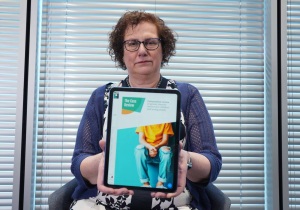(This item first appeared in the Brighton Argus on 15th May 2024)
Last week we learned that young people are not familiar with certain insults that were common in my youth. They don’t know what ‘plonker’, ‘berk’, ‘nitwit’, ‘numpty’ and ‘git’ mean. These are just the polite ones. I was reprimanded once by the then Mayor of Brighton for calling another councillor an “a…”. I can’t say the word as this is a family newspaper!
 Labour activists, especially here in Sussex where Labour is pitching itself as a fresh alternative to the Conservatives, will be at a loss for words to describe their bewilderment, confusion, perplexity, bafflement, bemusement, puzzlement and befuddlement that Sir Keir Starmer has welcomed the hard right Tory MP, Natalie Elphicke, into the Labour Party. Perhaps some are privately, and some not-so-privately, are calling Starmer a plonker, berk, nitwit, numpty and a stupid git for this mind-baffling decision.
Labour activists, especially here in Sussex where Labour is pitching itself as a fresh alternative to the Conservatives, will be at a loss for words to describe their bewilderment, confusion, perplexity, bafflement, bemusement, puzzlement and befuddlement that Sir Keir Starmer has welcomed the hard right Tory MP, Natalie Elphicke, into the Labour Party. Perhaps some are privately, and some not-so-privately, are calling Starmer a plonker, berk, nitwit, numpty and a stupid git for this mind-baffling decision.
When I first heard that Elphicke had defected to Labour I had to check the date. It was May 8th, not April 1st. I couldn’t have been more surprised had Nigel Farrage joined George Galloway’s Workers Party of Britain!
But what a pyrrhic victory it is proving to be for Starmer. He will have relished the momentary befuddlement of Tory MPs at Prime Minister’s Questions when they realised that Elphicke had defected to Labour. Her following Lee Anderson to Reform UK was a more likely scenario.
Within minutes Labour MPs were expressing incredulity that one of the most right-wing Conservatives MPs, a member of the European Research Group, someone who was staunchly pro-Brexit, had been so warmly welcomed into their party. Elphicke is not a good fit for the Labour Party. Just a year ago she wrote an article calling Starmer “Sir Softie” and she accused Labour of wanting “open borders”. She wrote: “Not only have Labour got no plan of their own to tackle illegal immigration, they simply do not want to.” Now Labour is having to resist Tory calls for an enquiry into Elphicke’s past behaviour.
Listening to Labour front benchers’ feeble attempts to justify the decision to accept Elphicke’s defection has been painful in the extreme. A regular on the airwaves, Anneliese Dodds, lost whatever remaining personal credibility she had as she failed to explain away Elphicke’s gaslighting of the victims of her husband’s sexual assaults and harassment, victim-blaming them. While Elphicke got the mildest censure from Parliament for this, surely someone with her record should have no place in Labour. Dodds, Labour’s Shadow Secretary of State for Women and Equality, should be calling out Elphicke on this, not minimising it.
I often wonder why Labour fields lame performers such as Dodds, Pat McFadden and Jonathan Reynolds (the so-called Minister for the Today Programme). Does the party have a cunning plan to bore listeners into submission, believing that if we zone out before the end of their first sentence we won’t be left confused, perplexed, baffled, bemused, puzzled and befuddled by their tortuous non-answers. This strategy seems to be working as Labour extends its lead in the polls. Either that or, as is more likely, the Conservatives are now so discredited that not even a modern-day Churchill could possibly save them from their inevitable defeat come the general election.
It won’t be this easy for Labour once in office. The banality of their spokespeople will be exposed. Fortunately Labour has some secret weapons who are not being utilised for fear of them looking dynamic and interesting when compared to Starmer himself. One is our own Peter Kyle who is intelligent, interesting, thoughtful, and charming in person and on the airwaves.
As for the Green Party, the decision of their Brighton Pavilion candidate, Siân Berry, to resign from the Greater London Assembly a mere three days after being re-elected, will leave Londoners confused, perplexed, baffled … you get the idea. Labour activists are suggesting that it shows a lack of commitment, with some asking how can one support a candidate with so little staying power. But perhaps this is all part of a cunning plan by Berry. Gone at a stroke is her only source of income, but she is demonstrating her total commitment to Brighton Pavilion. It also shows her increasing confidence, supported by the polls and Labour fielding what appears to be a paper candidate, that she will retain the seat comfortably.
Back to Labour. Is there anyone that it wouldn’t accept as a member? Yes there is. While Starmer welcomes Elphicke with open arms, Britain’s first black woman MP, Diane Abbott, continues to be excluded. That alone suggests a lot about Starmer’s Labour Party.










